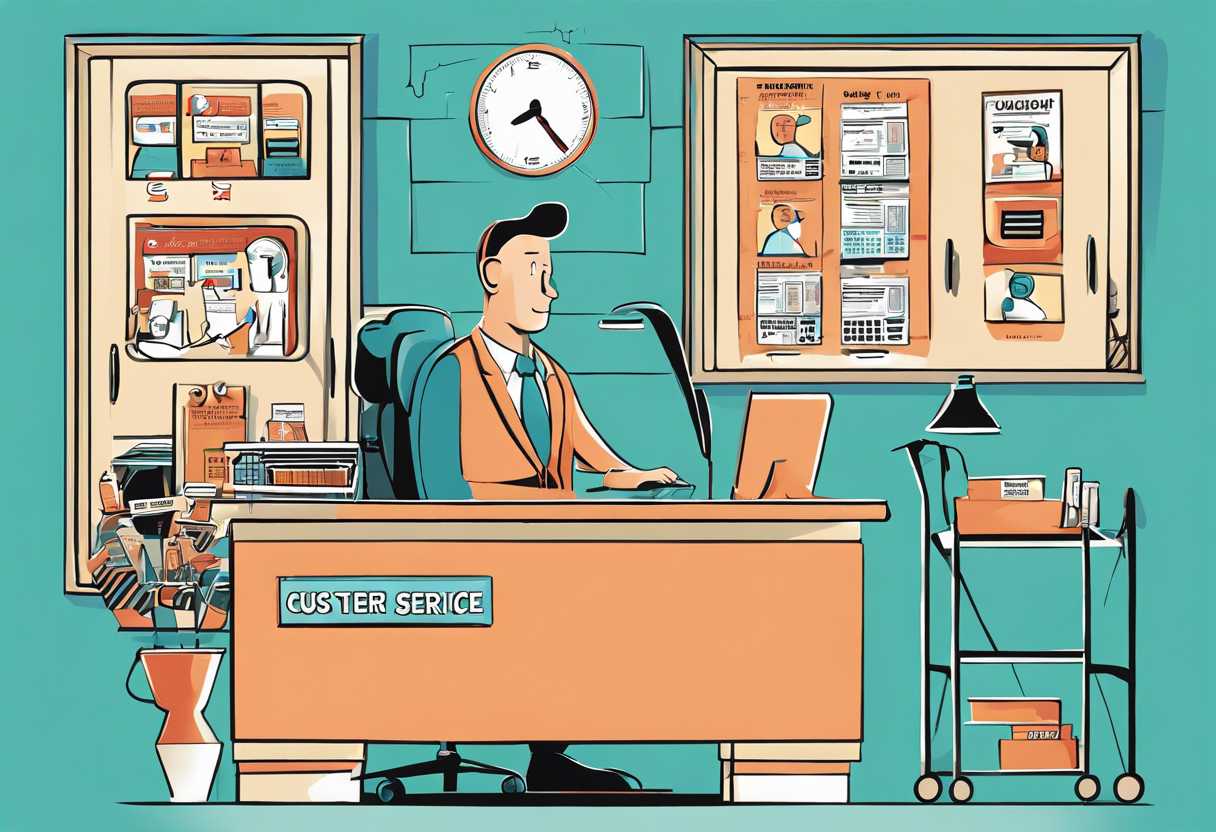In today’s competitive business landscape, the relationship between customer service and marketing is a topic of great significance. Many experts argue that customer service is an integral part of marketing, while others believe that they are distinct functions with separate roles and responsibilities. In this blog post, we will delve into the debate and explore the impact of customer service on brand reputation and customer loyalty. We will also discuss the importance of integrating customer service and marketing strategies for business success, as well as the best practices and case studies that demonstrate how customer service can be leveraged as a powerful marketing tool. By the end of this post, you will have a clear understanding of the intricate relationship between customer service and marketing, and how businesses can effectively navigate and capitalize on this dynamic interplay.
Understanding the Relationship Between Customer Service and Marketing
The Impact of Customer Service on Marketing
Customer service plays a crucial role in shaping a company’s marketing efforts. When customers have positive experiences with a brand’s customer service, they are more likely to become loyal customers and advocates for the brand. On the other hand, poor customer service can lead to negative word-of-mouth and damage a company’s reputation. It’s essential for businesses to understand that customer service is an integral part of their marketing strategy.
Aligning Customer Service and Marketing Strategies
For a company to be successful, it’s important for its customer service and marketing strategies to be aligned. This means that the messaging and promises made in marketing materials should be consistent with the actual customer experience. When these two areas are in sync, it creates a positive feedback loop where satisfied customers become brand ambassadors, leading to increased sales and customer retention.
Utilizing Customer Feedback for Marketing Insights
Customer service interactions provide valuable insights that can be used to inform marketing strategies. By analyzing customer feedback, companies can identify pain points, preferences, and trends that can be leveraged to improve products and services, as well as tailor marketing campaigns to better resonate with their target audience. This data-driven approach can lead to more effective marketing efforts and ultimately, increased customer satisfaction and loyalty.

The Impact of Customer Service on Brand Reputation and Customer Loyalty
Customer Service and Brand Reputation
Customer service plays a crucial role in shaping a brand’s reputation. When customers have positive experiences with a company’s customer service, they are more likely to view the brand favorably. On the other hand, poor customer service can lead to negative perceptions of the brand, which can ultimately damage its reputation. According to a study by American Express, 33% of Americans say they’ll consider switching companies after just a single instance of poor service. This highlights the significant impact that customer service has on brand reputation.
The Link Between Customer Service and Customer Loyalty
Customer service also has a direct impact on customer loyalty. When customers feel valued and supported by a company’s customer service team, they are more likely to remain loyal to the brand. In fact, research shows that 86% of customers are willing to pay more for a better customer experience. This demonstrates the strong correlation between customer service and customer loyalty. Brands that prioritize exceptional customer service are more likely to retain their customers and foster long-term loyalty.
The Role of Customer Service in Building Trust
One of the key benefits of providing excellent customer service is the ability to build trust with customers. When customers receive prompt, helpful, and personalized support from a company, they are more likely to trust the brand and its products or services. Trust is a critical factor in customer relationships, as it influences purchasing decisions and overall satisfaction. By consistently delivering exceptional customer service, brands can establish trust with their customers, leading to increased loyalty and positive word-of-mouth referrals.

Integrating Customer Service and Marketing Strategies for Business Success
The Importance of Aligning Customer Service and Marketing
Customer service and marketing are often viewed as separate entities within a business, but integrating the two can lead to significant benefits. By aligning customer service and marketing strategies, businesses can create a seamless and cohesive experience for their customers, ultimately leading to increased customer satisfaction and loyalty.
According to a study by Harvard Business Review, companies that successfully integrate customer service and marketing see a 15-20% increase in customer satisfaction and a 20-25% increase in customer retention.
Creating a Unified Customer Experience
When customer service and marketing work together, businesses can create a unified customer experience that spans across all touchpoints. This means that the messaging and branding that customers see in marketing materials aligns with the level of service they receive when interacting with the business. This consistency helps to build trust and credibility with customers, ultimately leading to increased sales and customer loyalty.
Research from Salesforce found that 76% of customers expect consistent interactions across departments within a company, highlighting the importance of a unified customer experience.
Utilizing Data and Feedback for Continuous Improvement
Integrating customer service and marketing allows businesses to leverage data and customer feedback to continuously improve their strategies. By analyzing customer interactions and feedback, businesses can gain valuable insights into customer preferences, pain points, and areas for improvement. This data can then be used to inform marketing strategies, product development, and customer service initiatives, ultimately leading to a more customer-centric approach.
A survey by Aberdeen Group found that companies with strong alignment between marketing and customer service are 3.3 times more likely to significantly exceed their business goals.
Differentiating Customer Service and Marketing: Roles and Responsibilities
Understanding Customer Service and Marketing
Customer service and marketing are two essential functions within a business, each with its own distinct roles and responsibilities. Customer service is focused on providing support and assistance to customers before, during, and after a purchase, while marketing is responsible for promoting and selling products or services to potential customers. It’s important to understand the differences between these two functions in order to effectively manage and optimize their performance.
Roles and Responsibilities of Customer Service
Customer service is primarily responsible for addressing customer inquiries, resolving issues, and providing support. This includes responding to customer emails, phone calls, and social media messages, as well as handling returns and exchanges. Customer service representatives are also tasked with ensuring customer satisfaction and loyalty by delivering exceptional service and building strong relationships with customers.
Roles and Responsibilities of Marketing
Marketing is focused on promoting products or services to attract and retain customers. This involves creating and implementing marketing strategies, conducting market research, and developing advertising campaigns. Marketers are also responsible for identifying target audiences, analyzing consumer behavior, and measuring the effectiveness of marketing efforts through various metrics such as conversion rates and return on investment (ROI).
Leveraging Customer Service as a Marketing Tool: Best Practices and Case Studies
Understanding the Role of Customer Service in Marketing
Customer service is often seen as a cost center, but it can be a powerful marketing tool when leveraged effectively. By providing exceptional customer service, businesses can create loyal customers who are more likely to recommend the brand to others. In fact, 86% of consumers are willing to pay more for a better customer experience. This makes customer service an essential part of a company’s marketing strategy.
Best Practices for Using Customer Service in Marketing
One of the best practices for using customer service as a marketing tool is to personalize the customer experience. This can be achieved by training customer service representatives to address customers by name and tailor their interactions to the individual’s needs. Additionally, businesses should actively seek feedback from customers and use it to improve their products and services. Another best practice is to integrate customer service with marketing efforts, such as using customer testimonials in advertising or sharing positive customer experiences on social media.
Case Studies of Successful Customer Service Marketing
One notable case study of successful customer service marketing is Zappos, an online shoe and clothing retailer. Zappos has built its brand around exceptional customer service, going above and beyond to satisfy customers. This has resulted in a 75% repeat customer rate and numerous word-of-mouth referrals. Another case study is Ritz-Carlton, a luxury hotel chain known for its legendary customer service. Ritz-Carlton empowers its employees to resolve customer issues on the spot, leading to a 98% customer satisfaction rate and a strong brand reputation.
Conclusion
After exploring the intricate relationship between customer service and marketing, it is evident that these two functions are not mutually exclusive but rather interconnected. Customer service plays a pivotal role in shaping brand reputation and fostering customer loyalty, which are essential components of successful marketing strategies.
Integrating customer service and marketing efforts can lead to a more cohesive and impactful approach to engaging with customers and driving business growth. By aligning these functions, businesses can deliver a seamless and consistent experience that resonates with their target audience.
It is crucial to recognize the distinct roles and responsibilities of customer service and marketing, as they each contribute unique value to the overall customer experience. Leveraging customer service as a marketing tool involves implementing best practices and drawing inspiration from successful case studies to enhance customer satisfaction and drive brand advocacy.
As businesses continue to navigate the evolving landscape of customer engagement, it is imperative to prioritize the alignment of customer service and marketing strategies. By doing so, organizations can cultivate meaningful connections with their customers and position themselves for sustained success in the competitive marketplace.
Ultimately, the integration of customer service and marketing is essential for delivering exceptional customer experiences and driving business growth. Embracing this synergy can empower businesses to build stronger relationships with their customers and differentiate themselves in the market.
As you consider the implications of this discussion for your own business, we encourage you to reflect on how you can leverage the relationship between customer service and marketing to elevate your brand and drive meaningful results. By embracing this holistic approach, you can unlock new opportunities for growth and create lasting value for your customers.

